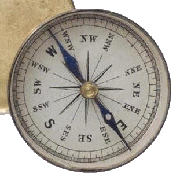Almost 200 years ago, J. W. Norie wrote the following in his introduction to
"The New and Complete Epitome of Practical Navigation" (1828):
NAVIGATION is that art which instructs the Mariner in what manner to
conduct a Ship through the wide and trackless ocean, from one part to another,
with the greatest safety, and in the shortest time possible.
It is difficult to trace the origin of this most important Art, to
which a diversity of events might have give rise; but, in all probability,
it ows its birth to Necessity, the parent of almost every human invention.
The Sea Coasts, in many places, are full of Islands at no great distance
from the Continent: curiosity would naturally inspire men with an inclination
to visit these Islands, and consequently prompt them to devise means by which
they might convey themselves from one place to another on the surface of the water;
and as this passage did not appear either very long or very dangerous, they determined
to attempt it: success in one of these efforts might encourage a second ...
The confusion and uncertainty in which the first Navigators must have found
themselves, when either prompted by their enterprising spirit to visit remote parts,
or driven by violence of storms out of the sight of land, would naturally induce
them to study some method of finding where they were in such circumstances ...
|
Throughout the history of exploration, seafaring and navigation,
numerous terms and conventions have been established many of which
have later been adapted world-wide. Many of these conventions are
related to the basic elements of navigation such as distance, time and
charts.
Also the different instruments for navigation, which have been developed
throughout the centuries are based on this basic understanding of terms and
conventions.
By far the most important convention establishes the system of the
Earth Latitude-Longitude coordinates, which also defines the basic grid for
navigational charts. Other conventions define how distance and direction
are measured on the curved surface of the Earth.
|

|
|
Even in the GPS-age, navigators will have to know the meaning and origin
of the involved terms, techniques and conventions in order to gain full
understanding of the navigational task.
|